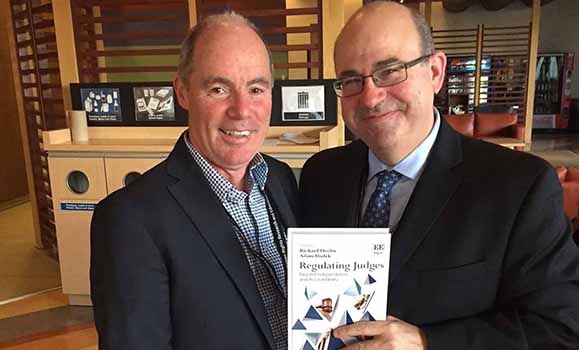News
» Go to news mainKUDOS! Professor Richard Devlin is co‑editor and co‑author of the groundbreaking book "Regulating Judges"

There’s no question that judges are increasingly significant social, cultural, and political individuals and institutions – and like every individual and institution, they need to have mechanisms of accountability.
When Professor Richard Devlin and Adam Dodek, a professor at the University of Ottawa’s Faculty of Law, proposed a book on that topic to Edward Elgar Publishing in 2012, they were met with enthusiasm. After five years of production, the launch party of Regulating Judges: Beyond Independence and Accountability was held in early June at the Realizing Rights Human Rights and Constitutionalism conference at the University of Ottawa (Devlin and Professor Sheila Wildeman presented on the Canadian Judicial Council’s complaints and discipline process at the conference).
“Our book moves beyond the traditional polarized debate,” says Devlin. “It provides a framework that identifies multiple variables for the assessment of an effective and legitimate judiciary. The best way to do that is to consider different ways in which different jurisdictions establish support and regulate their judiciaries.”
‘Them’s fighting words’
Regulating Judges marries the literature on regulation with the literature on judiciaries. “It’s the first time any academic that we know of has done so,” says Devlin, who was aware that the topic would be met with some resistance in judicial circles. Chapter 4 is called “ ‘Fighting words’: regulating judges in Canada”; Devlin came up with its title after describing the book’s topic to a very senior Canadian judge, who said, “Them’s fighting words!”
There were challenges to collaborating with co-authors from 19 countries, including “getting people together to talk about stuff,” says Devlin. That happened at three international conferences in London, England, in 2014, Milan in 2015, and New York City in 2016.
This was one of the very best collaborations and one of the better projects I’ve done in 30 years. It was hard work but fun. — Professor Richard Devlin
“We also wanted to get a diverse number of people from different jurisdictions in various countries who think very differently,” says Devlin. “Politics was another issue – some countries are less open to being criticized about their own jurisdictions.”
Because English wasn’t the first language of every co-author, “quite heavy editing” was required for certain submissions. Devlin and Dodek divided the duties this way: Dodek took the lead on writing Chapter 4 about Canada, while Devlin took the lead on writing the introduction, “Regulating judges: challenges, controversies and choices.” They edited an equal number of chapters.
“This was one of the very best collaborations and one of the better projects I’ve done in 30 years,” says Devlin. “It was hard work but fun.”
The next frontier
The readership of Regulating Judges is intended to be anyone with an interest in the judiciary, from judges, lawyers, and law students to political scientists. “There’s a broad audience who will benefit from this book,” says Devlin.
The biggest finding from editing Regulating Judges was that you can’t de-politicize judicial appointments – judicial appointments everywhere in the world are a problem, which didn’t come as a surprise to Devlin. “Judicial education is one of the next frontiers that needs to be addressed,” he says. “Every country thinks they have the perfect system.”
Recent News
- Assistant Professor Liam McHugh‑Russell ft in "Dispute at B.C. ports may reignite over employers' push on automation: expert"
- Professor Emeritus Wayne MacKay ft in "Legal column: What's the legal line between freedom of expression and hate speech?"
- Professor Emeritus Wayne MacKay ft in "The Todd Veinotte Show, July 8, 2024"
- Standing Up For The World
- Professor Emeritus Wayne MacKay ft in "Victim believes hate motivated downtown Halifax attack: ‘People will be terrified to hold their partner’s hand walking down the street’"
- Professor Emeritus Jocelyn Downie ft in "Opinion: Forced transfers for assisted dying are cruelty cloaked as compassion"
- Professor Emeritus Wayne MacKay ft in "Be practical, not idealistic to scrap partial‑day plans: expert"
- Professor Emeritus Jocelyn Downie ft in "A British Columbia court challenge to end forced transfer for medical assistance in dying"
